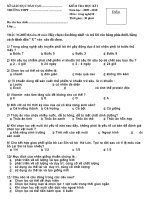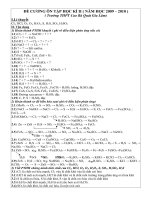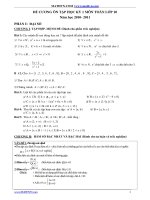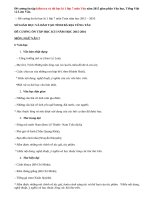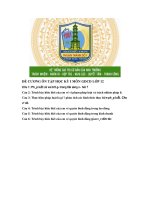de cuong on tap hoc ki 1 LOP 10
Bạn đang xem bản rút gọn của tài liệu. Xem và tải ngay bản đầy đủ của tài liệu tại đây (76.31 KB, 8 trang )
ĐỀ CƯƠNG ÔN TẬP HỌC KÌ 1
Môn: Tiếng Anh 10
I/ Choose the word whose underlined part has a different pronunciation from the others in each group:
1/ A. feather
B. head
C. healthy
D. meat
2/ A. found
B. shout
C. bought
D. mouse
3/ A. find
B. gift
C. private
D. night
4/ A. brown
B. down
C. now
D. shown
5/ A. kitchen
B. when
C. mess
D. debt
6/ A. technology
B. different
C. mental
D. dentist
7/ A. computer
B. from
C. box
D. doctor
8/ A. site
B. kilo
C. might
D. nine
9/ A. various
B. bad
C. hang
D. jam
10/ A. football
B. pool
C. tool
D. moon
II/ Choose the word whose main stress is placed differently from the others in each group:
1/ A. partner
B. something
C. classmate
D. discuss
2/ A. number
B. software
C. manage
D. invent
3/ A. become
B. hardware
C. letter
D. music
4/ A. office
B. language
C. around
D. other
5/ A. beauty
B. machine
C. daily
D. modern
III/ Choose the best answer to complete each sentence:
1. We .............have English on Monday, Tuesday and Friday.
A. usual
B. frequent
C. usually
D. normal
2. He always gets bad marks ...................his laziness.
A. because
B. although
C. because of
D. in spite of
3. Which of the following is NOT a type of the mass media?
A. television
B. dictionaries
C. radio
D. newspapers
4. ...............channels are there on our .....................TV?
A. How much/ nation
B. How many/ nation
C. How much/ national
D. How many/ national
5. Marie Curie was a ................student. She had a fully developed mind.
A. old
B. strong
C. mature
D. young
6. The school for .................has been here for 10 years.
A. disable
B. the disable
C. disabled
D. the disabled
7. Your bookshelf is full .................books.
A. with
B. in
C. of
D. by
8. Which of the following does NOT relate to the computer?
A. footwear
B. soft ware
C. floopy disk
D. hard ware
9. The Browns like ................holidays best. They are in and out of the sea all day.
A. hill
B. beach
C. activity
D. mountain
10. Threre are a lot of food and drink on the table. She..............a party.
A. is going to have
B. will have
C. has
D. has had
11. My parents always .................me to learn better.
A. encourage
B. encouraged
C. has encouraged
D. encouraging
12. When I was a little girl, I ................with toys.
A. use to play
B. used to play
C. uses to play
D. used playing
13. I want to know the name of the girl................the first prize last year.
A. which got
B. which get
C. who got
D. who get
14. All of us enjoy................a day off.
A. have
B. to have
C. having
D. had
15. Our Uncle Ho.............to many countries before the August Revolution...........took place in 1945.
A. travelled/ which
B. had travelled/ who
C. had travelled/ which
D. travels/ which
16. A lot of presents ..................since Christmas Eve.
A. bought
B. has been bought C. had bought
D. have been bought
17. Some people...................in this area recently, ..............very worrying.
A. have been attacked/ which is
B. have attacked/ that is
C. attacked/ that is
D. had attacked/ which is
18. Don’t forget…….the lights when you leave the room.
A. to turn off
B. turning off
C. turn off
D. turned off
19. The old………… a lot of experiences in life.
A. has
B. have
C. is having
D. had
20. We are going on a …………….. to Vung Tau next week.
A. two day trip
B. two-days trip
C. two-day trip
D. two day trip
21. Ambulances arrived at the scene of the accident and took …………….. to hospital.
A. the sick
B. the poor
C. the injured
D. the old
22. There was nobody left on the train,……………………made me suspicious.
A. where
B. that
C. which
D. who
23. My glasses are in my book bag, but I don't remember .....................................them there.
A. I put
B. putting
C. to put
D. put
24. I do not know ......................the machine .Are you willing ................me with this?
A. starting / helping
B. what starting / to help
C. how to start / to help
D. to start/ help
25. The house ...............more than 5 years ago, but I’m not going to have it done again for a while.
A. is painted
B. was painted
C. paint
D. painted
26. People …………live in glass houses shouldn’t throw stones
A. who
B. whom
C. which
D. Ø
27. A calculating machine can do calculations with lightning speed .
A. very quickly
B. very slowly
C. incorrectly
D. perfectly
28. At last, the discussion came to an end with, the sound conclusions.
A. finished
B. delayed
C. postponed
D. persuaded
29.............................his poor family, he studies very well.
A. Although
B. In spite of
C. Because
D. Because of
30. Nam isn’t content with his present salary.
A. excited
B. interested in
C. satisfied with
D. disappointed about
31. By the time you .........................the gift, your brother..............................in Hanoi.
A. received / arrived
B. had received / arrived
C. received / had arrived
D. had received / had arrived
32. Television can make things........................because it presents information in an effective way.
A. memorable
B. memory
C. memorial
D. memorably
33. My class decided to go on a(n).........................because we wanted to relax after work.
A. destination
B. formation
C. excursion
D. permission
34. “ ............................do you have a History lesson ?” - Twice a week.
A. How long
B. When
C. How many
D. How often
35. “You must be tired. Why don't you stop ......................a rest.”
A. having
B. and had
C. to have
D. have
36. .....................the shortages of good medical care, diseases are the most terrible threat to those villagers.
A. Because of
B. Although
C. In spite of
D. Because
37. He .....................................London 2 years ago and I .......................................him since then.
A. left / haven't seen
B. left / hadn't seen
C. was living / haven't seen
D. left / didn't see
38. It is divided into five different parts: the Pacific, Atlantic, Indian, Antarctic and Arctic Oceans.
A. individual
B. dissimilar
C. singular
D. many
39. Decide which of the three options below is the best title for the passage.
A. voices
B. desires
C. choices
D. answers
40. Ask and answer questions about the uses of modern inventions.
A. up-to-date
B. new
C. late
D. present
41. A woman asks a man not to smoke in the room.
- Woman: “Would you mind putting out your cigarette please ?”- Man:” ______”.
A. Yes, of course
B. Not at all
C. I don’t mind smoking D. No, you can
42. A student and a teacher are talking to each other.
-Student: I’m so sorry that I was late for the appointment.
-Teacher: ______! Just try not to be late again.
A. It’s ok
B. Way to go
C. Me too
D. You’re welcome
43. My father used to giving me some good advice whenever I had a problem.
A
B
C
D
44. We didn’t use to get up early when we were children.
A
B
C
D
45. My mother is used to getting up early in the morning.
A
B
C
D
IV. READING:
PART I/ Read the following passage and mark the letter A, B, C, or D on your answer sheet to indicate
the correct word or phrase that best fits each of the numbered blanks.
The joy of picnics
Years ago, in the days when I was just a kid, my family used to have Sunday picnics together (1) ______ a
nearby part of the countryside. We would find a suitably and pleasant spot then spend several hours chatting,
eating and playing games in the open air. Since then, though, my parents’ life has become so much busier and
they never seem to have time for outdoor family meals any more.
In my view this is a great pity, so I’ve recently started to organize picnics of my own. I get in touch with some
of my closest friends and first we decide on a suitable place to go. Then we talk about who’ll bring which food.
This (2) ______ that there will be a variety of tasty things to eat, particularly (3) ______ everyone makes the
meals they do best. It’s important, though, to keep the food simple, (4) ______ everything has to fit into a
backpack and then be carried across fields and up river valleys.
When we finally reach our destination, it’s time to sit down, relax and enjoy each other’s company. And I’m (5)
______ certain that food tastes far better on a picnic than anywhere else!
Question 1: A. in
B. on
C. of
D. with
Question 2: A. ensure B. ensured
Question 3: A. unless B. so
Question 4: A. however
B. but
Question 5: A. absolute
B. absolutely
C. ensures
D. ensuring
C. if
D. though
C. therefore
D. as
C. absolutory
D. disabsolute
The Skywalk
The Grand Canyon in the United States was created by the River Colorado. People visit the Grand Canyon Park
to go walking and running but (1) ______ to look at the view. It is a wonderful view made even better by the
Skywalk. The distance (2) ______ the Skywalk to the bottom of the Grand Canyon is 1219 metres. It is a
platform (3) ______ walls and floor are built of glass so that you can see the beautiful rocks of the canyon. Up
to 120 people are allowed to stand on it at the same time. It opened in 2007 and since then thousands of people
have used it. You have to (4)______ special covers over your shoes to avoid scratching the glass beneath your
feet. Walking onto the Skywalk makes you (5)______like a bird floating high up in the air.
Question 1: A. hugely
B. mainly
C. greatly
D. completely
Question 2: A. from
B. through
C. by
D. for
Question 3: A. who
B. where
C. whose
D. which
Question 4: A. take
B. wear
C. dress
D. charge
Question 5: A. guess
B. understand
C. agree
D. feel
ALFRED NOBEL
When we hear the name Nobel, we immediately think of the Nobel prizes. But Alfred Nobel, the creator of the
awards, was also a great scientist and inventor.
Born in 1833 in Sweden, Nobel studied first in Russia and then emigrated to the US, (1) ______ he studied
mechanical engineering. Afterwards, he returned to Sweden to work with his father. Gradually, they made (2)
______ in explosives. Nobel figured out how to work safely with nitroglycerine, a very dangerous and
explosive substance. His invention later became known (3) ______ dynamite. Nobel continued throughout his
life to (4) ______ improvements in the field of explosives. He eventually owned numerous factories around the
world and became very wealthy.
Alfred Nobel was a man of great achievement. When he died, he left a wonderful gift to the world: the Nobel
Prizes. Each year these prizes are (5) ______ to scientists, inventors and other creative people for their great
contribution to the world.
Question 1. A. which
B. where
C. when
D. X
Question 2. A. directions
B. motions
C. movements
D. advances
Question 3. A. by
B. with
C. as
D. for
Question 4. A. do
B. make
C. take
D. have
Question 5. A. awarded
B. designed
C. suggested
D. passed
PART II/ Read the following passage and mark the letter A, B, C, or D on your answer sheet to indicate the
correct answer to each of the questions.
PASSAGE 1
The Notice
Attention, all students:
In the past week, several students have been caught violating the school’s dress code. On account of that, I
would like to list which clothes are acceptable and which are not.
Boys must wear long pants and button-down shirts. These shirts must have collars since all boys have to wear
neckties as well. Furthermore, boys must wear either dress shoes or nice shoes. Sneakers, sandals, jeans, shorts,
T-shirts, sleeveless shirts, tank tops, and other similar casual articles of clothing are not allowed.
Girls must wear slacks or skirts as well as blouses. All skirts must go down below the knees of the students
wearing them. Girls may also wear dresses so long as they are not too formal. The clothes that are prohibited
for boys and may also not be worn by girls.
Students who violate the dress code will be sent to their homes to change and be given detentions or
suspensions. Multiple violations of the dress code will result in them being sent to the principal’s office.
We insist that all students comply with the dress code. Should you have any objections to the school’s dress
code, I am willing to speak with you about them.
Question 1: What is the purpose of the notice?
A. To punish some students for wearing improper clothes
B. To announce that the dress code has been abolished
C. To inform students about the school’s dress code
D. To advise students to wear their uniforms everyday
Question 2: In line 10, the word prohibited is closest in meaning to ______.
A. advised
B. forbidden
C. registered
D. requested
Question 3: What does the author say about clothing for boys?
A. They may wear jeans or shorts to school.
B. They are supposed to wear ties to school.
C. T-shirts are acceptable clothing for them.
D. Their clothes must be ironed and look nice.
Question 4: In line 12, the word them refers to ______.
A. students
B. their homes
C. detentions or suspensions
D. multiple violations
Question 5: What can be inferred from the notice about Tina Wimberley?
A. She works as a teacher in addition to serving as school principal.
B. She recently began her employment at the school.
C. She expects some students to violate the school’s dress code.
D. She is planning to make the school’s dress code more casual.
PASSAGE 2
One of the most popular literary figures in American literature is a woman who spent almost half of her
long life in China, a country on a continent thousands of miles from the United States. In her lifetime she
earned this country's most highly acclaimed literary award: the Pulitzer Prize, and also the most prestigious
form of literary recognition in the world, the Nobel Prize for Literature.
Pearl S. Buck was almost a household word throughout much of her lifetime because of her prolific literary
output, which consisted of some eighty - five published works, including several dozen novels, six collections
of short stories, fourteen books for children, and more than a dozen works of nonfiction. When she was eighty
years old, some twenty - five volumes were awaiting publication. Many of those books were set in China. Her
books and her life served as a bridge between the cultures of the East and the West. As the product of those two
cultures she became as the described herself, "mentally bifocal." Her unique background made her into an
unusually interesting and versatile human being. As we examine the life of Pearl Buck, we cannot help but be
aware that we are in fact meeting three separate people: a wife and mother, an internationally famous writer and
a humanitarian and philanthropist. One cannot really get to know Pearl Buck without learning about each of the
three.
Though honored in her lifetime with the William Dean Howell Medal of the American Academy of Arts and
Letters in addition to the Nobel and Pulitzer prizes. Pearl Buck as a total human being, not only a famous
author but also a captivating subject of study.
Question 1: What is the author's main purpose in the passage?
A. To offer a criticism of the works of Pearl Buck.
B. To illustrate Pearl Buck's views on Chinese literature.
C. To indicate the background and diverse interests of Pearl Buck.
D. To discuss Pearl Buck's influence on the cultures of the East and the West.
Question 2: According to the passage, Pearl Buck is known as a writer of all of the following EXCEPT______.
A. novels
B. children's books
C. poetry
D. short stories
Question 3: The word “this” in paragraph 1 refers to______.
A. a continent
B. the United States
C. the East
D. China
Question 4: According to the passage, Pearl Buck described herself as "mentally bifocal" to suggest that she
was ______.
A. capable of resolving the differences between two distinct linguistic systems
B. keenly aware of how the past could influence the future
C. capable of producing literary works of interest to both adults and children
D. equally familiar with two different cultural environments
Question 5: The author's attitude toward Pearl Buck could best be described as ______.
A. indifferent
B. admiring
C. sympathetic
D. tolerant
PASSAGE 3
It is commonly believed in the United States that school is where people go to get an education. Nevertheless, it
has been said that today children interrupt their education to go to school. The distinction between schooling
and education implied by this remark is important.
Education is much more open-ended than schooling. Education knows no bounds. It can take place anywhere,
whether in the shower or on the job, whether in a kitchen or on a tractor. It includes both the formal learning
that takes place in schools and the whole universe of informal learning. The agents of education can range from
a revered grandparent to the people debating politics on the radio, from a child to a distinguished scientist.
Whereas schooling has a certain predictability, education quite often produce surprises. A chance conversation
with a stranger may lead people to discover how little is known of other religions. People are engaged in
education from infancy on. Education, then, is a very broad term. It is lifelong process, a process that starts long
before the start of school, and one that should be an integral part of one’s entire life.
Schooling, on the other hand, is a specific, formalized process, whose general pattern varies little from one
setting to the next. Throughout a country, children arrive at school at approximately the same time, take
assigned seats, are taught by an adult, use similar textbooks, do homework, take exams, and so on. The slices of
reality that are to be learned, whether they are the alphabet or an understanding of the workings of government,
have usually been limited by the boundaries of the subject being taught.
For example, high school students know that they are not likely to find out in their classes the truth about
political problems in their communities or what the newest film makers are experimenting with. There are
definite conditions surrounding the formalized process of schooling.
Question 1. What does the author probably mean by using the expression ‘children interrupt their
education to go to school’?
A. going to several different schools is educationally beneficial.
B. School vacations interrupt the continuity of the school year.
C. Summer school makes the school year too long.
D. All of life is an education.
Question 2. The word ‘chance’ is closest in meaning to ______.
A. unplanned
B. unusual
C. lengthy
D. lively
Question 3. The phrase ‘For example’ introduce a sentence that gives examples of ______.
A. similar textbooks
B. the results of schooling
C. the working of a government
D. the boundaries of classroom subjects.
Question 4. The passage supports which of the following conclusions?
A. Without formal education, people would remain ignorant.
B. Education systems need to be radically reformed.
C. Going to school is only part of how people become educated.
D. Education involves many years of professional training.
Question 5. The passage is organized by _______.
A. listing and discussing several educational problems.
B. contrasting the meanings of two related words
C. narrating a story about excellent teachers
D. giving examples of different kinds of schools
V. Rewrite each sentence, beginning as shown, so that the meaning stays the same.
1. I need a phone card to phone my parents. (Make question for the underlined part)
→ ………………………………………………………................................................
2. Although the traffic was heavy, he managed to get to the office in time.
→ In spite of …………………………………………………………………...............
3. The weather is terrible but tourists come here. (using “ despite “)
→ In spite of ………………………………………………………................................
4. Because she was absent from the school yesterday, she couldn’t understand the lesson.
→ Because of ………………………………………………………………………….…
5. Although he had a good salary, he was unhappy in his job.
→ In spite of ………………………………………………………..................................
6. After I had waited for my teacher for ten minutes, he arrived.
→ Before ………………………………………………………………………………………………
7. He did his homework, then he went to bed.
→ After ………………………………………………………………………………………………
8. My father no longer works for that construction company. (using “used to”)
→ My father …………………………………………………………………………………………..
9. He doesn’t eat meat any more.
→ No longer …………………………………………………………………………………………..
10. Tom visits his grandparents twice a month.
→ ………………………………………………………................................................
11. She has played the piano for two hours.
→ ………………………………………………………................................................
12. They built a new school last year.
→ ………………………………………………………................................................
VI. WRITING
1. Write a paragraph at least 70 words about the advantages of watching television.
------------------------------------------------------------------------------------------------------------------------------------------------------------------------------------------------------------------------------------------------------------------------------------------------------------------------------------------------------------------------------------------------------------------------------------------------------------------------------------------------------------------------------------------------------------------------------------------------------------------------------------------------------------------------------------------------------------------------------------------------------------------------------------------------------------------------------------------------------------------------------------------------------------------------------------------------------------------------------------------------------------------------------------------------------------------------------------------------------------------------------------------------------------------------------------------------------------------------------------------------------------------------------------------------------------------------------------------------------------------------------------------------------------------------------------------------------------------------------------------------------------------------------------------------------------------------------------------------------------------------ --------------------------------------2. Write a paragraph on the positive and negative influences of television. Which one do you agree with?
----------------------------------------------------------------------------------------------------------------------------
------------------------------------------------------------------------------------------------------------------------------------------------------------------------------------------------------------------------------------------------------------------------------------------------------------------------------------------------------------------------------------------------------------------------------------------------------------------------------------------------------------------------------------------------------------------------------------------------------------------------------------------------------------------------------------------------------------------------------------------------------------------------------------------------------------------------------------------------------------------------------------------------------------------------------------------------------------------------------------------------------------------------------------------------------------------------------------------------------------------------------------------------------------------------------------------------------------------------------------------------------------------------------------------------------------------------------------------------------------------------------------------------------------------------------------------------------------------------------------------------------------------------------------
